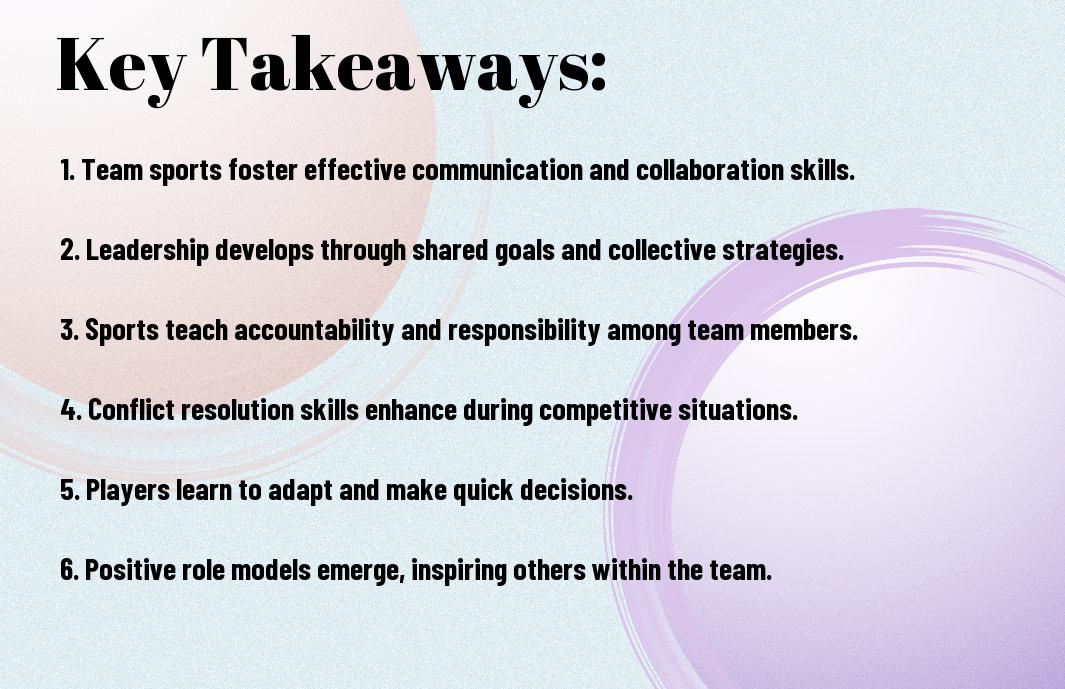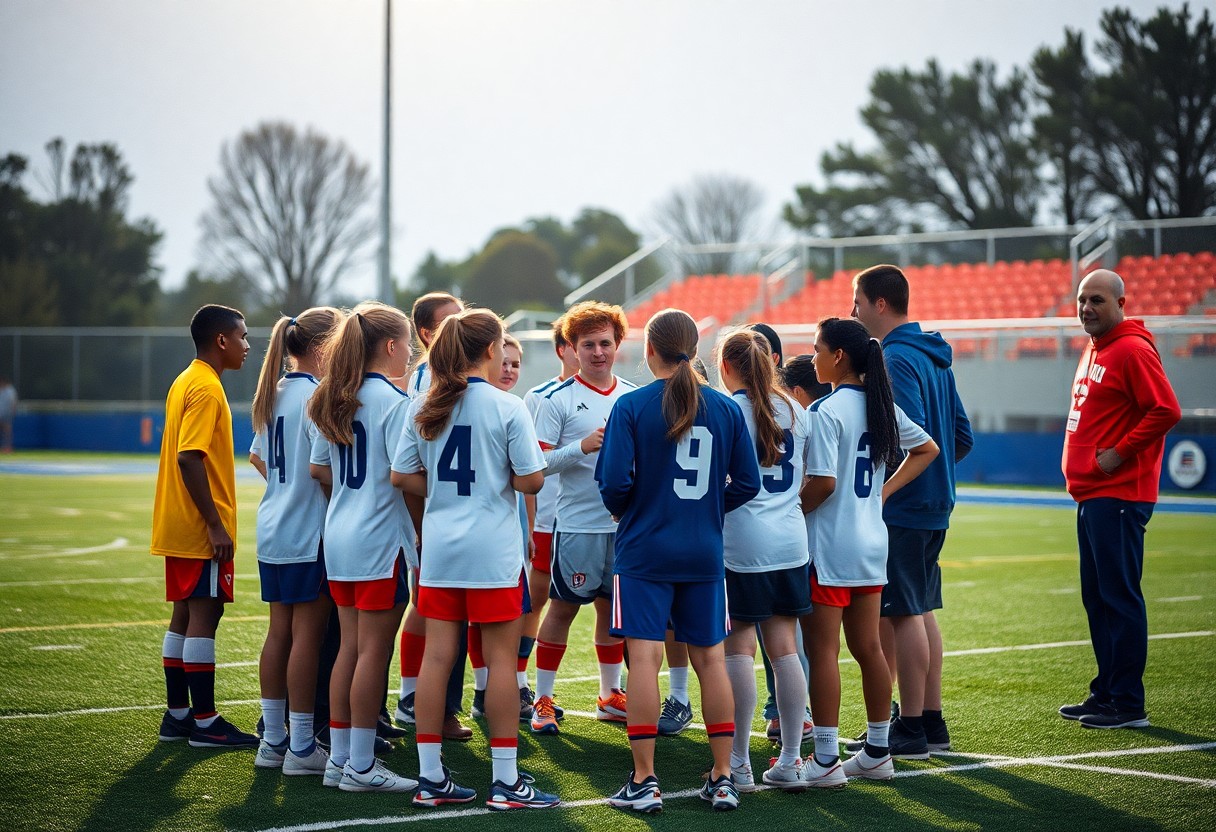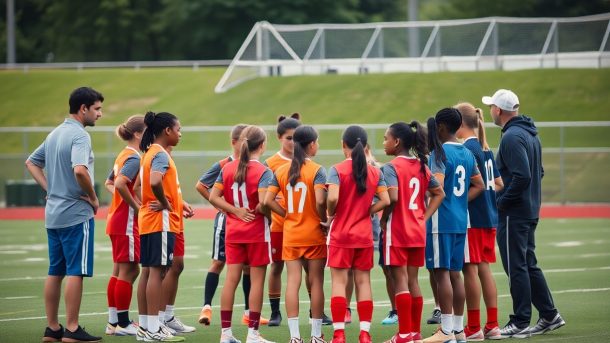There’s a significant connection between participating in team sports and developing crucial leadership skills that can benefit you in various aspects of life. Engaging in sports not only fosters teamwork and communication but also enhances your decision-making and problem-solving abilities under pressure. As you collaborate with others towards a common goal, you learn valuable lessons in empathy, resilience, and accountability. This blog post will explore how your involvement in team athletics can shape your potential as a leader, both on and off the field.
Key Takeaways:
- Collaboration: Team sports foster a strong sense of cooperation among players, enhancing their ability to work together towards common objectives.
- Communication: Engaging in team sports improves verbal and non-verbal communication skills, crucial for effective leadership.
- Resilience: Athletes learn to handle setbacks and failures, building mental toughness and a problem-solving mindset that are vital for leaders.
- Responsibility: Being part of a team instills a sense of accountability, as each member’s performance directly impacts the group’s success.
- Adaptability: Competitive settings teach players to adjust strategies on the fly, an important skill for leaders in dynamic environments.

The Essence of Team Sports
Your journey into team sports can significantly shape your leadership qualities. Engaging in these activities not only fosters camaraderie but also instills a sense of responsibility and accountability. For insights on Leadership Skills You Can Learn from Sports, consider how these experiences translate into real-world leadership capabilities.
Definition and Types of Team Sports
One of the most engaging aspects of team sports is their variety and structure. Team sports are competitive physical activities where individuals are organized into teams. These sports require teamwork, strategy, and communication to achieve common goals. Here are some types of team sports:
| Sport Type | Description |
| Football | A sport involving two teams trying to score by advancing a ball into the opponent’s end zone. |
| Basketball | A fast-paced game where teams score by shooting a ball through the opponent’s hoop. |
| Volleyball | Teams use their hands to hit a ball over a net, aiming to land it in the opponent’s court. |
| Hockey | A game played on ice or field where teams use sticks to hit a puck or ball into the goal. |
| Rugby | A contact sport where teams carry or kick a ball to score points by reaching the opponent’s goal line. |
Thou can explore various team sports that cultivate not just physical health, but also vital leadership skills.
Historical Context and Evolution
On the timeline of civilization, team sports have developed alongside societal growth. Historically, these activities served not only a recreational purpose but also a means to unite individuals under shared objectives. Various cultures have contributed unique games, emphasizing teamwork as a fundamental aspect.
Indeed, team sports have evolved from ancient practices to the organized competitions we see today. Events like the Olympic Games have historically showcased team collaboration, transcending borders and cultures. As society progressed, so did the understanding of teamwork, which is now recognized as necessary for personal and professional success. Team sports have become a significant avenue for training future leaders, blending physical skill with emotional intelligence and strategy.
Leadership Skills Developed Through Team Sports
The participation in team sports fosters imperative leadership skills that are beneficial both on and off the field. Engaging in these activities teaches you to prioritize teamwork, communicate effectively, and assume responsibility. You learn to take charge, motivate others, and navigate the complexities of interpersonal dynamics, all while striving toward a common goal.
Communication and Collaboration
Behind every successful team is a foundation built on effective communication and collaboration. As a player, you’re often required to convey your thoughts quickly and adapt your strategies based on the feedback from your teammates. This practice helps to enhance your ability to express ideas clearly and work with others harmoniously, all fundamental components of strong leadership.
Decision-Making and Problem-Solving
With team sports, you face numerous situations that demand quick thinking and collaborative decision-making. As you engage in games, you learn to assess situations swiftly, weigh the input of your teammates, and develop solutions that benefit the group. This experience cultivates your ability to lead effectively under pressure.
The experience gained through team sports involves addressing challenges in real-time, allowing you to practice and refine your decision-making skills. When you’re in the midst of a game, every minute counts, requiring you to analyze circumstances and choose the best course of action swiftly. This environment not only enhances your ability to solve problems but also strengthens your confidence in making decisions that impact the collective outcome. The skills you develop in these high-stakes scenarios prove invaluable as you transition into leadership roles in your personal and professional life.
The Impact of Coaching and Mentorship
Once again, the influence of coaching and mentorship extends beyond skill development, playing a significant role in fostering leadership abilities. Effective coaches not only enhance your technical capabilities but also serve as mentors, guiding you in understanding group dynamics, decision-making, and resilience. This nurturing environment allows you to develop qualities such as empathy, communication, and integrity, which are necessary for leadership, encouraging you to learn from setbacks and celebrate achievements collectively.
Role of Coaches in Leadership Development
Coaches play a pivotal role in your leadership development by modeling effective communication and problem-solving strategies. They provide feedback that helps you reflect on your performance while fostering a culture of accountability and teamwork. Their guidance encourages you to take initiative, inspire others, and cultivate a vision, all fundamental skills for effective leadership in any setting.
Peer-to-Peer Influence and Support
Around you, teammates and peers create a dynamic environment that enhances your learning and growth. The influence of your peers can inspire you to rise to challenges and foster collaboration, helping you build necessary leadership traits. The shared experiences in team sports allow you to learn from each other, reinforcing the collective effort towards common goals.
At team practices and matches, the support and encouragement from your peers create a strong foundation for leadership development. You learn to navigate conflicts, motivate one another, and celebrate successes together. The bonds formed through shared challenges not only enhance your sense of belonging but also allow you to practice guiding your teammates through difficulties, fostering a spirit of camaraderie that translates into effective leadership skills necessary in both sports and life.

Case Studies: Successful Leaders Who Played Team Sports
Keep in mind that some of the most successful leaders attribute their skills to their experiences in team sports. Here are a few notable case studies that highlight this connection:
- 1. Dell Founder Michael Dell – Played basketball in high school, building teamwork and strategic thinking.
- 2. Former U.S. President George W. Bush – A former baseball player who learned resilience and coalition-building.
- 3. Starbucks CEO Howard Schultz – Participated in football, leveraging team dynamics in business leadership.
- 4. Former NFL Coach Tony Dungy – His leadership philosophy is rooted in his experiences as a player.
- 5. Google Co-founder Sergey Brin – Played soccer, emphasizing collaboration and communication in his career.
For more on how sports can develop workplace leadership skills, check out How Sports Can Teach Workplace Leadership Skills.
Profiles of Notable Leaders
By exploring the backgrounds of notable leaders who participated in team sports, you can gain insight into how these experiences shape effective leadership. Leaders like Michael Dell and Howard Schultz exemplify the benefits of teamwork and communication fostered through athletic experiences. These profiles showcase how their involvement in sports cultivated skills vital for their success in business and beyond.
Lessons Learned from Their Experiences
From their rich athletic backgrounds, these leaders have gleaned valuable lessons that apply to the professional environment. Their experiences with team dynamics, conflict resolution, and decision-making convey critical insights for aspiring leaders.
Leaders who have transitioned from sports to business often emphasize the importance of teamwork and adaptability. They learned to navigate challenges collaboratively and motivate diverse groups—a key takeaway for you as you pursue your leadership development. Understanding how to effectively leverage collective strengths while encouraging individual contributions will enhance your ability to drive successful teams in your professional endeavors.
Challenges and Limitations in Team Sports
All athletes face various challenges and limitations when participating in team sports that can impede their development of leadership skills. These obstacles can stem from differing levels of commitment among teammates, communication barriers, and conflicts in personality or playing styles. Additionally, the competitive nature of sports may lead to stress and pressure, which can further complicate your ability to cultivate and demonstrate effective leadership within your team.
Potential Obstacles to Leadership Development
Before you can fully embrace leadership opportunities in team sports, you may encounter multiple obstacles. These could include a lack of clarity in roles, resistance from other team members, or even your own self-doubt. Identifying these potential hurdles is the first step to navigating them effectively, ensuring you create spaces where your leadership can flourish.
Strategies to Overcome Challenges
Above all, it’s crucial to develop practical strategies for overcoming the challenges you face in team sports. Fostering open communication, encouraging collaboration among teammates, and setting clear goals can all help you advance your leadership skills. Additionally, being mindful of team dynamics and actively seeking feedback from peers will allow you to adapt and strengthen your leadership approach.
Strategies for overcoming challenges in team sports often involve a multifaceted approach. By prioritizing team building, you can create an environment where every teammate feels valued and empowered. Engage in team meetings to address concerns and clarify expectations, nurturing an atmosphere of transparency. Implementing regular feedback loops will help you and your teammates identify growth areas, while developing a shared vision for success reinforces collective accountability. Furthermore, embracing flexibility allows you to adapt your leadership style to suit the unique dynamics of your team, ultimately enhancing your effectiveness as a leader.
To wrap up
Considering all points, engaging in team sports plays a significant role in enhancing your leadership skills. By participating in team-oriented activities, you cultivate necessary qualities such as communication, cooperation, and resilience. These experiences not only shape your ability to lead but also prepare you for future challenges in various aspects of life. Embrace the opportunity to develop these vital skills through sports, and explore more about this journey in Fostering Future Leaders: How Team Building Through Sports ….
Q: How do team sports help develop leadership qualities in individuals?
A: Team sports provide a dynamic environment where individuals can practice and enhance their leadership qualities. Players often find themselves in situations where they must communicate effectively, motivate teammates, and make strategic decisions under pressure. Through experiences such as coordinating offensive plays or resolving conflicts among team members, individuals learn to take charge, delegate responsibilities, and support their peers, all of which are fundamental aspects of leadership.
Q: What specific skills can participants learn from engaging in team sports that are applicable to leadership roles?
A: Participants in team sports can cultivate a variety of skills that are highly applicable to leadership roles, including but not limited to teamwork, effective communication, conflict resolution, and adaptability. The collaborative nature of team sports necessitates that players work together toward a common goal, fostering a sense of unity and shared purpose. Additionally, they must often communicate strategies and feedback, which enhances their ability to articulate thoughts and listen actively—a significant trait in effective leaders. Adapting to changing circumstances, such as game dynamics, also teaches flexibility, which is vital for any leadership position.
Q: Are there age-specific benefits of team sports in developing leadership skills?
A: Yes, the benefits of team sports in fostering leadership skills can vary by age group. For younger participants, team sports can introduce foundational concepts such as cooperation and respect for others. As individuals progress to their teenage years, the focus often shifts to more complex skills such as problem-solving and conflict management. Young adults participating in organized sports may further refine their leadership capabilities through roles such as team captain or peer mentors, where they can take initiative and demonstrate accountability. Overall, regardless of age, team sports can serve as a powerful platform for continuous leadership development.



